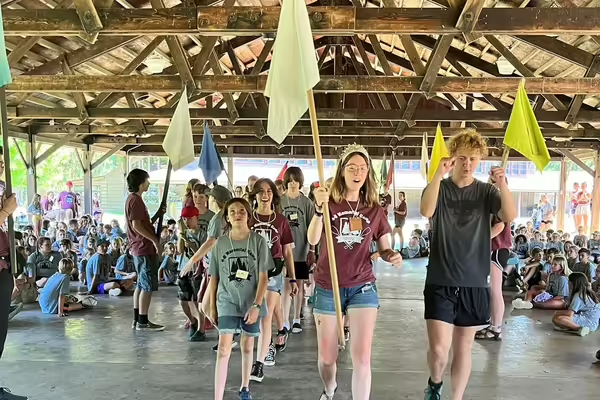
PEKIN, Ill. - Summer camp programs are a long-standing tradition throughout the country. They provide positive youth development through overnight experiences in outdoor settings away from the distractions of everyday life. Summer 4-H camps offer a unique aspect in that they engage older youth as leaders. Teens are not only the recipients of a 4-H camp program, they help guide it!
An example is programming at 4-H Memorial Camp (Illinois 4-H’s residential camping facility in Monticello). Teen leaders serve as full employees and camp counselors. In these roles, they care for younger children, teach skills, and bring a sense of carefree fun to the camp environment.
Teen leaders went even further in the summer of 2022. They reviewed 4-H Thriving Model data collected from campers during the most recent year of camp (2019). Researchers Amy Leman, University of Illinois faculty member, and Emily Schoenfelder, Extension 4-H youth development educator serving the Fulton-Mason-Peoria-Tazewell Unit, led them through this process using a “data party” technique in which counselors spent time learning about the campers’ perceptions of the Developmental Context at camp. The Developmental Context refers to the aspects of a 4-H program that make it high-quality, such as providing youth with the opportunity to form relationships, feel like they belong, and explore their passions and interests, or “sparks”. While reviewing this data, counselors recorded things that surprised them or that stood out as important. As a group, they set goals and created implementation plans largely centered around building healthy relationships with their campers.
At the end of each 2022 summer camp session, campers were once again asked about their perceptions. It was found that for first year campers, all indicators related to relationships statistically increased compared to 2019. Indicator examples included campers believing the counselors respected them, held them accountable, and expected them to do something positive with their future.
Additionally, this process helped foster independence and agency within the counselors by helping them understand that their actions and decisions can affect change. For instance, 96% percent of responding counselors indicated they interacted with campers differently due to this process, and 82% felt their actions made a difference to the campers. One staff member described the effects of this change by saying, “This summer I noticed more campers discovering ‘sparks’ at my program area than any other summer I've worked at 4-H camp. What stuck out to me the most was campers experiencing ‘spark’ moments that weren't even necessarily related to the program we were running, but related to counselors and staff sharing common interests with campers.”
Schoenfelder summed up this participatory process saying, “This is such a great example of what 4-H can do! Helping young people build relationships and develop leadership skills is what 4-H is all about!”
Photo cutline
Long-time Tazewell County 4-H member, Ashleigh Janssen, uses the leadership skills fostered in the 4-H club program during her time as a camp counselor at 4-H Memorial Camp. In 2022, teen and adult camp staff analyzed camper evaluation data to come up with goals and plans to build stronger relationships with campers and improve the camper experience.
Illinois Extension leads public outreach for University of Illinois by translating research into action plans that allow Illinois families, businesses, and community leaders to solve problems, make informed decisions, and adapt to changes and opportunities. Illinois Extension is part of the University of Illinois Urbana-Champaign College of Agricultural, Consumer and Environmental Sciences.